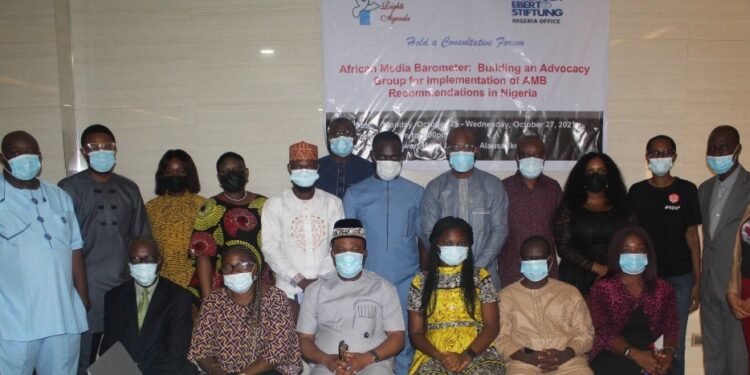Media Development Organizations, Media Professionals, trainers and other stakeholders are collaborating towards implementing the recommendations of the African Media Barometer (AMB), to create a conducive media environment in Nigeria.
The stakeholders are also proposing a legislative framework that would specifically ensure the protection of journalists against every form of abuse and attacks.
The propositions were made during a 3-day consultative forum organized by Friedrich-Ebert-Stiftung in collaboration with the Media Rights Agenda, with the theme – ‘African Media Barometer: Building an Advocacy Group for the implementation of AMB recommendations in Nigeria’.
In her opening remarks, the Programe Manager of Friedrich-Ebert-Stiftung (FES), Nigeria, Juliana Anosike noted that the forum was designed to set up a platform that would drive the implementation of recommendations of AMB reports for the past 13 years, since it started.
According to her “The AMB is an analytical tool to measure the national media environments on the African continent. Unlike other media indices the AMB is a self-assessment exercise based on home grown criteria derived from African Protocols and Declarations like the “Declaration of Principles on Freedom of Expression in Africa” (2002) by the “African Commission for Human and Peoples’ Rights (ACHPR).
“It is also designed to serve as a practical lobbying tool for media reform. Its results are presented to the public of the respective country to push for an improvement of the media situation using the AU-Declaration and media documents as benchmarks.
“In this regards the recommendations of the AMB-Report are expected to be integrated into the advocacy work by local FES-offices and partners. These recommendations can also be used by other donors and African media organisations,” Anosike added.
Mr. Edetaen Ojo, Executive Director, Media Rights Agenda, who shared the reports from AMB since 2008 to 2019 explained that detailed advocacy strategy needed to be developed to ensure that the AMB recommendations are implemented, to create a safe space for media professionals.
Mr. Ojo noted that there are 4 Sector Matrix for Advocacy Strategy Development which would help to guide the Implementation of the AMB Recommendations in Nigeria.
The four sectors are; “Freedom of expression, including freedom of the media, is effectively protected and promoted; the media landscape, including new media, is characterised by diversity, independence and sustainability; Broadcasting regulation is transparent and independent; the state broadcaster is transformed into a truly public broadcaster; the media practise high levels of professional standards.”
Participants at the consultative forum believed that there is need to amend Sections 22 and 39 of the Nigeria 1999 Constitution (as amended) which explains the obligations of the media but do not specifically provide for the safety and protection of journalists.
They noted that, “There should be a definite provision for media freedom and protection of journalists enshrined in the Nigerian Constitution.”

